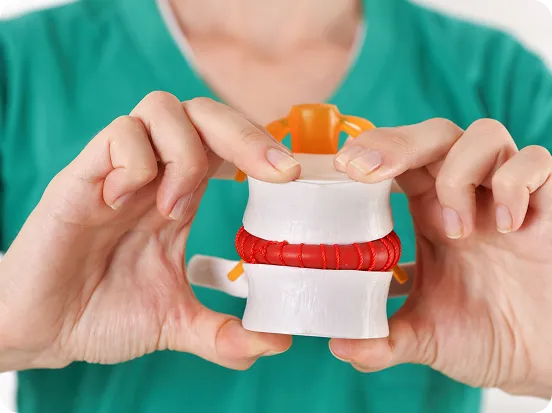Vertiflex Interspinous Spacers
Minimally invasive relief for lumbar spinal stenosis.

What Is the Vertiflex Procedure?
The Vertiflex Procedure involves placing a small device between the spinous processes (the bony protrusions at the back of the spine) in the lower back. This spacer gently opens the space between vertebrae, reducing pressure on the spinal nerves that cause pain, numbness, or weakness in the legs and back.
It’s ideal for patients with moderate lumbar spinal stenosis who feel better when sitting or leaning forward.
What Is the Vertiflex Procedure?
The Vertiflex Procedure involves placing a small device between the spinous processes (the bony protrusions at the back of the spine) in the lower back. This spacer gently opens the space between vertebrae, reducing pressure on the spinal nerves that cause pain, numbness, or weakness in the legs and back.
It’s ideal for patients with moderate lumbar spinal stenosis who feel better when sitting or leaning forward.

How It Works
The procedure is performed under local anesthesia through a small incision. Using live imaging guidance, your provider inserts the Vertiflex implant between the vertebrae. Once in place, the device opens like wings to keep the space expanded and reduce nerve compression.
It usually takes 20–30 minutes and is done in an outpatient setting.
Benefits of the Vertiflex Procedure
The Vertiflex Procedure offers a modern, less invasive approach to relieving spinal stenosis symptoms. It provides lasting pain relief with fewer risks, faster recovery, and high satisfaction among patients looking to avoid major surgery.
Minimally Invasive
Small incision with minimal tissue disruption for quicker healing and less scarring.
Faster Recovery
Most patients resume light activities within a few days with minimal downtime.
No General Anesthesia Required
Done under local anesthesia for reduced risk and faster recovery times.
Spine-Preserving
No bone removal or spinal fusion required, preserving your natural spinal structure.
Minimally Invasive
Small incision with minimal tissue disruption for quicker healing and less scarring.
Conditions Treated with Vertiflex
Vertiflex is commonly used to treat:
Lumbar Spinal Stenosis
Narrowing of the spinal canal causing nerve compression and leg pain.
Neurogenic Claudication
Pain, tingling, or weakness in the legs that worsens when standing or walking and improves when sitting or bending forward.
Grade 1 Spondylolisthesis
Mild vertebral slippage contributing to spinal canal narrowing.
Persistent Symptoms Despite Conservative Treatment
When physical therapy, medications, or injections haven’t provided relief.
What to Expect During the Procedure
01 Before the Procedure
✔ Review of your medical history and spine-related symptoms.
✔ Imaging studies (X-rays or MRI) to confirm spinal stenosis.
✔ Instructions on fasting and stopping certain medications before the procedure.
02 During the Procedure
✔ Local anesthesia is used to numb the lower back.
✔ A small incision is made to access the lumbar spine.
✔ The Vertiflex spacer is inserted and positioned using imaging guidance.
✔ The implant opens to relieve nerve pressure, and the incision is closed.
03 After the Procedure
✔ Brief monitoring after the procedure before going home.
✔ Avoid strenuous activity or lifting for a few days.
✔ You may be prescribed non-opioid medication to manage mild discomfort.
✔ A follow-up appointment will help assess recovery and implant positioning.
Ideal Candidates for Vertiflex
You may be a good candidate if:
Back or Leg Pain When Standing or Walking
Symptoms that worsen with upright posture and activity.
Relief When Sitting or Leaning Forward
Pain improves when bending over or sitting down.
Tried Conservative Treatments Without Relief
Medications, therapy, or injections haven’t worked after several months.
Seeking a Minimally Invasive Alternative to Surgery
Looking to avoid spinal fusion or more invasive procedures.
Risks and Potential Side Effects
While the Vertiflex Procedure is generally considered safe, there are some risks to be aware of.
Common Side Effects
You may experience mild discomfort at the incision site, along with temporary swelling or bruising. These symptoms are usually short-lived and resolve without intervention.
Rare but Serious Complications
Though uncommon, possible complications include infection at the surgical site, bleeding, fracture of the spinous process, or implant migration. Your provider will thoroughly review these risks with you before the procedure to help you make an informed decision.

Care That’s Close to Home
We offer care from two convenient clinic locations, making it easy to access expert medical support close to home.
Each facility is designed to provide a welcoming, safe, and efficient environment equipped with advanced technology and supported by a compassionate team dedicated to your well being.
Care That’s Close to Home
We offer care from two convenient clinic locations, making it easy to access expert medical support close to home.
Each facility is designed to provide a welcoming, safe, and efficient environment equipped with advanced technology and supported by a compassionate team dedicated to your well being.

Why Choose Spinal Diagnostics?
Patients choose Spinal Diagnostics for our comprehensive approach, accurate diagnostics, and compassionate care. We stay at the forefront of interventional procedures and are committed to improving your quality of life without opioids or invasive surgeries.
Proven Medical Expertise
We bring years of clinical experience in pain management and interventional procedures.
Constant Innovation
We use the latest techniques and technology to ensure safe, effective treatment.
Compassionate Care
We listen, understand, and treat every patient with empathy and respect.
Personalized Plans
Each treatment is tailored to your condition, goals, and lifestyle.
Discover what's behind your pain.
Explore the conditions we treat and find the answers you’ve been looking for.
Discover what's behind your pain.
Explore the conditions we treat and find the answers you’ve been looking for.

